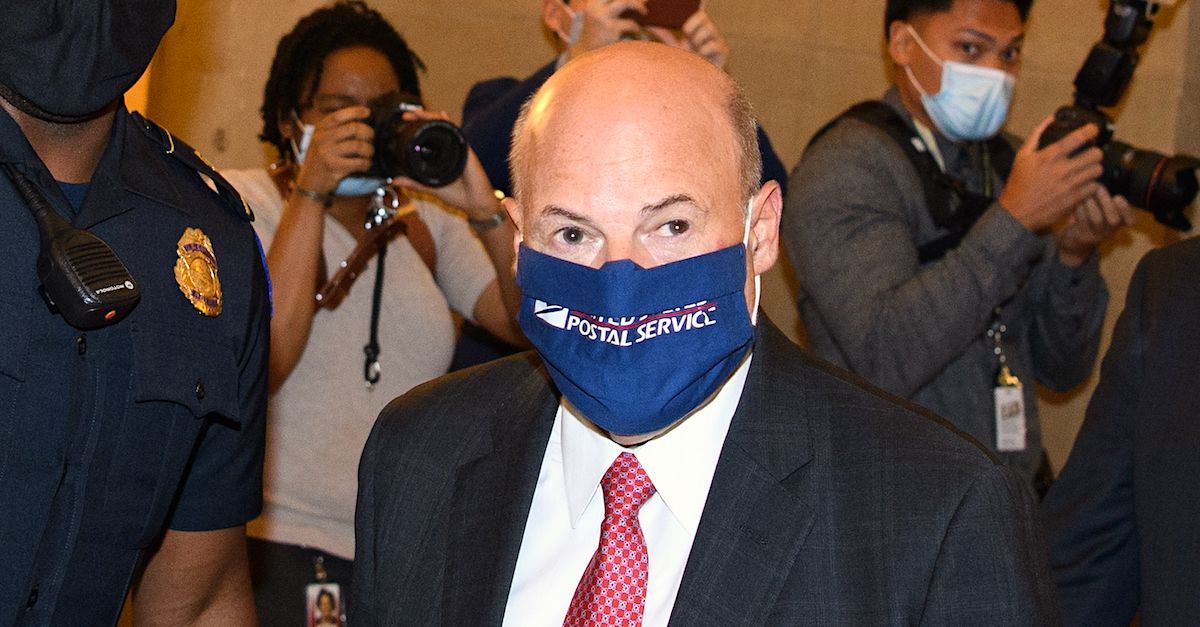
Postmaster General Louis DeJoy
U.S. Postmaster General Louis DeJoy allegedly ascended to the heights of federal government employment by way of what is known as a straw donor scheme. Legal experts say the alleged facts are evidence of a crime that should be easy to prosecute.
The allegations are tidily summed up in the headline of a Sunday afternoon story by the Washington Post: “Louis DeJoy’s rise as GOP fundraiser was powered by contributions from coworkers who were later reimbursed, former employees say.”
Pressed to account for the behavior at issue, a close parsing of DeJoy’s response through a spokesman shows he didn’t exactly deny the story:
Here is DeJoy’s response to WAPO article. I couldn’t find the denial pic.twitter.com/zsQpvCpFYu
— Daniel Uhlfelder (@DWUhlfelderLaw) September 6, 2020
The statement did say, however, that DeJoy “sought and received” legal advice to make sure he had “complied with any and all laws.”
Under federal law, having someone else make a campaign finance contribution on your behalf is expressly illegal.
Per a Federal Election Commission (FEC) explainer:
Contributions in the Name of Another are Strictly Prohibited
Reimbursing someone for a contribution or otherwise contributing in the name of another person can result in substantial civil penalties and jail time. The FEC and the Department of Justice have prosecuted several such cases over the last few years. These violations sometimes occur when an individual who has already contributed up to the limit to a campaign gives money to another person to make a contribution to the same candidate.
DeJoy, a resident of North Carolina, caught the attention of the Tarheel State’s attorney general over the weekend.
“It is against the law to directly or indirectly reimburse someone for a political contribution,” North Carolina Attorney General Josh Stein (D) tweeted. State law also prohibits the practice and there is no statute of limitations for violations of the state statute–which are felonies.
Stein declined to comment further aside from saying that the “appropriate” authorities should investigate the claims.
And while any such potential investigation is unlikely to be timely viz. the upcoming general election, several legal experts believe that DeJoy could be in legal jeopardy—or, rather, that he should be.
“Using straw donors is a crime because it allows fundraisers to cheat campaign contribution limits,” said University of Michigan Law Professor Barbara McQuade. “If report is true that DeJoy committed this conduct in 2016, then the heat is on. Five-year statute of limitations won’t run until 2021.”
“Not to mention layup of a wire fraud case,” added California-based law professor and legal columnist Harry Litman, referencing the pliable federal statute that allows prosecutors to bring charges for almost any sort of fraud imaginable.
Attorney George Conway, fresh off of a self-imposed temporary Twitter exile, chimed in with a much further afield suggestion:
also possibly tax fraud to the extent straw-donor reimbursement came in the form of tax-deductible employee wages
— George Conway (@gtconway3d) September 7, 2020
But, to others, such rapid analyses leave several questions open:
If Postmaster DeJoy committed campaign finance & other crimes that are within the statute of limitations, the question is, will Barr’s DOJ bring a timely prosecution? Will they investigate at all? DOJ can only do its job when people have confidence in its integrity.
— Joyce Alene (@JoyceWhiteVance) September 6, 2020
Former DOJ attorney and administrative law expert Sasha Samberg-Champion suggested that it isn’t just the “brazenness” of DeJoy’s “illegal conduct” that’s “stunning”:
It really is amazing that we now have fairly strong evidence that the Postmaster General secured his job on the back of systemic and intentional violations of campaign finance laws . . . and nothing happens. https://t.co/GWoP2hrarv
— Sasha Samberg-Champion (@ssamcham) September 7, 2020
[image via MANDEL NGAN/AFP via Getty Images]
Have a tip we should know? [email protected]